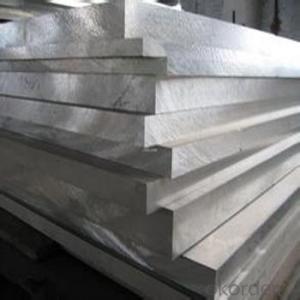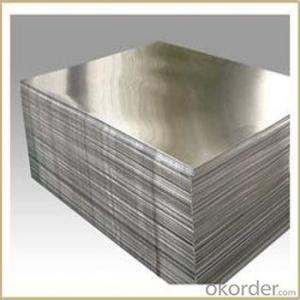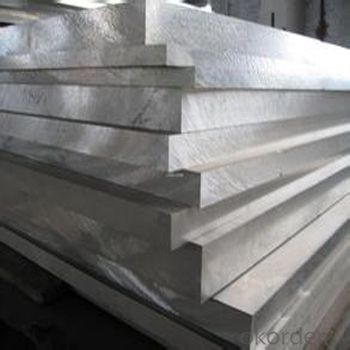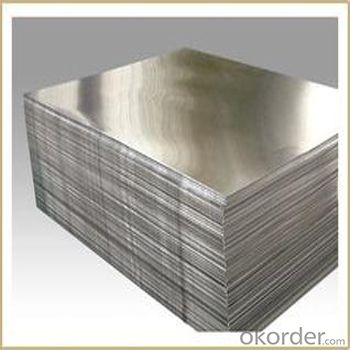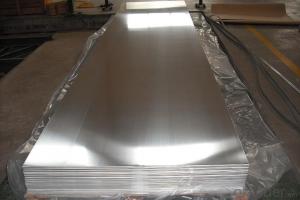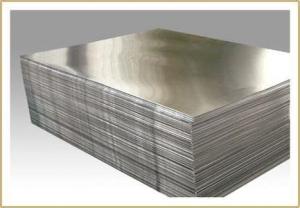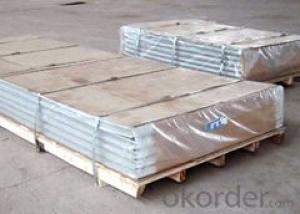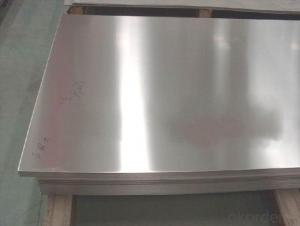Marine Grade Aluminum Sheets, Plates, and Boards
- Loading Port:
- Shanghai
- Payment Terms:
- TT OR LC
- Min Order Qty:
- 1 m.t.
- Supply Capability:
- 100 m.t./month
OKorder Service Pledge
OKorder Financial Service
You Might Also Like
1.Specification
ALLOY: AA1*** (AA1050,AA1060,AA1070,AA1100 etc.)
AA3*** (AA3003,AA3004,AA3005,AA3105 etc.)
AA5*** (AA5052,AA5083,AA5754 etc)
AA8*** (AA8011,AA8006 etc)
TEMPER: H14,H16,H18,H22,H24,H26,H32,O/F
THICKNESS: 0.2mm-100mm
WIDTH: 30mm-1700mm
STANDARD: GB/T 3880-2006
Special specification is available on customer's requirement
2.Description
Aluminium is oxidized by water at temperatures below 280°C to produce hydrogen, aluminium hydroxide and heat:2 Al + 6 H2O → 2 Al(OH)3 + 3 H2
This conversion is of interest for the production of hydrogen. Challenges include circumventing the formed oxide layer, which inhibits the reaction and the expenses associated with the storage of energy by regeneration of the Al metal.
Aluminium is theoretically 100% recyclable without any loss of its natural qualities. According to the International Resource Panel's Metal Stocks in Society report, the global per capita stock of aluminium in use in society (i.e. in cars, buildings, electronics etc.) is 80 kg (180 lb). Much of this is in more-developed countries (350–500 kg (770–1,100 lb) per capita) rather than less-developed countries (35 kg (77 lb) per capita). Knowing the per capita stocks and their approximate lifespans is important for planning recycling.
3.Our advantage
We can supply the best quality!
4.Pictures
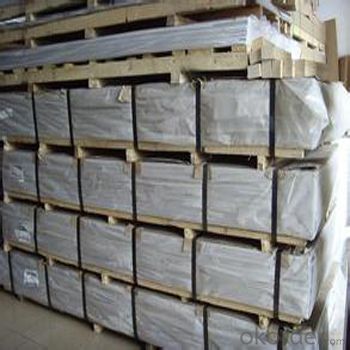
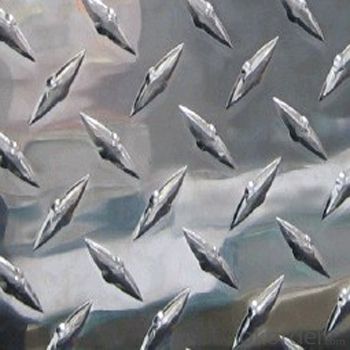
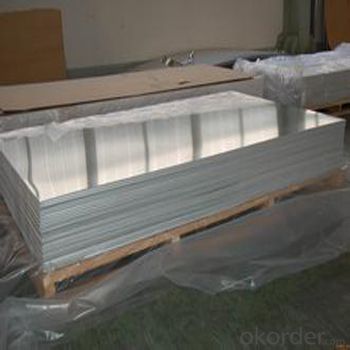
5.FAQ
1)what is aluminum?
Aluminium (or aluminum; see spelling differences) is a chemical element in the boron group with symbol Al and atomic number 13. It is a silvery white, soft, nonmagnetic, ductile metal. Aluminium is the third most abundant element (after oxygen and silicon), and the most abundant metal in the Earth's crust. It makes up about 8% by weight of the Earth's solid surface.
Aluminium metal is so chemically reactive that native specimens are rare and limited to extreme reducing environments. Instead, it is found combined in over 270 different minerals.The chief ore of aluminium is bauxite.
2)What's kind of payment term we can supply?
CIF,CFR, FOB and other.
3)Can we supply samples?
Yes, we can!
4)What can you do if you have other quastions?
You can contact us freely at any time!
- Q: Do 101 aluminum sheets have any specific insulation properties?
- No, 101 aluminum sheets do not have any specific insulation properties. Aluminum is a good conductor of heat and electricity, which means it does not provide insulation against heat or cold. However, aluminum sheets can be used as a reflective surface to reflect heat or light. To provide insulation, additional materials such as foam or fiberglass can be added along with the aluminum sheets.
- Q: For my chem class that I just barely started taking, we're making bohr models. Even though my teacher explained it, I still dont get the concept of it all, like how the protons are lined up in their inner circle and the outer circles. I get everythign else about atoms except how they're actually made up lol. Maybe someone on here can explain it to me? I hope so because i have to make a model for it for friday.The element I'm asigned is aluminum btwYour help is greatly appreciated!
- People also rarely display the vast space between the orbitals and the nucleus. That would be a good one. If it is aluminum that you are showing, Why not make it out of aluminum? Hope this helps.
- Q: Are aluminum sheets non-magnetic?
- No, aluminum sheets are not magnetic.
- Q: Are aluminum sheets conductive?
- Indeed, aluminum sheets possess conductivity. Being a metal, aluminum exhibits exceptional electrical conductivity. Consequently, aluminum sheets facilitate the smooth passage of electricity, rendering them suitable for an array of applications that necessitate conductivity, including electrical wiring, power transmission lines, and electronic devices.
- Q: doesn't particularly need to be welding but i need to make an air tight permanent seal around 2 very thin sheets of aluminium (like .02 inches thick) i was thinking .02 inch 5052 aluminum because its the thinnest i can find but am obviously up for suggestions.
- TIG okorder /
- Q: What is the thickness range available for aluminum sheets?
- The specific requirements and applications can cause the thickness range of aluminum sheets to vary. Typically, aluminum sheets come in a variety of thicknesses, ranging from very thin at 0.006 inches (0.15mm) to very thick at 0.5 inches (12.7mm) or even thicker in certain cases. It should be noted that the supplier or manufacturer may have different availability of specific thicknesses. Furthermore, specialized fabrication processes can often provide custom thicknesses.
- Q: What is the thermal expansion coefficient of aluminum sheets?
- The thermal expansion coefficient of aluminum sheets typically ranges from 22 to 24 x 10^-6 per degree Celsius.
- Q: I just built a stone wall with illuminated glass features embedded, and to make them shine evenly, I had all sides but the visual one wrapped in industrial thickness aluminium foil. One week later, the foil has disintegrated. I have used type 10 Portland. What is going on?
- Embedded aluminum roof flashing, aluminum water stops, aluminum electrical conduit, introduced aluminum powder (sometimes used to foam concrete), or embedded structural aluminum shapes may all corrode in concrete or mortar. In all cases, a reaction that forms aluminum hydroxide and hydrogen gas occurs, and may cause expansion and cracking of the concrete or mortar. The common use of calcium chloride (or other alkali compounds), and dampness of the concrete increases the reaction rate. Usually, coating the aluminum with bituminous paint, impregnated paper or felt, plastic, or an alkali-resistant coating will prevent or sharply reduce the corrosion.
- Q: Are aluminum sheets suitable for heat exchangers?
- Aluminum sheets, indeed, are well-suited for heat exchangers due to their numerous advantageous qualities. Firstly, aluminum, being a highly conductive metal, facilitates efficient heat transfer, effectively enhancing the performance of the heat exchanger. Furthermore, its lightweight composition simplifies the handling and installation process within heat exchanger systems. Moreover, aluminum exhibits remarkable resistance against corrosion, guaranteeing the heat exchanger's endurance and sturdiness. Additionally, the malleability of aluminum sheets enables effortless shaping and sizing, thus enabling customization for various heat exchanger designs. In summary, aluminum sheets provide exceptional thermal conductivity, corrosion resistance, and versatility, rendering them a fitting choice for heat exchanger applications.
- Q: What are the safety precautions when working with aluminum sheet?
- To ensure your well-being and reduce the likelihood of accidents or injuries, it is essential to observe specific safety measures when working with aluminum sheet. Consider the following precautions: 1. Personal Protective Equipment (PPE): Safeguard yourself against potential hazards by wearing appropriate PPE, such as safety glasses, gloves, and a long-sleeved shirt. Aluminum shavings can cause injuries if they come into contact with your skin due to their sharpness. 2. Ventilation: Work in a well-ventilated area or employ local exhaust ventilation systems to prevent the accumulation of fumes and dust. Inhalation of large quantities of aluminum dust or fumes can be harmful. 3. Fire safety: As aluminum is highly flammable, it is crucial to keep flammable materials away from the work area. Ensure you have a fire extinguisher readily available and know how to use it in case of emergencies. 4. Tool safety: Verify that all tools and equipment used for cutting, bending, or shaping aluminum are in good working condition. Accidents are more likely to occur with dull or damaged tools. Follow proper tool handling techniques and avoid using excessive force to minimize the risk of injuries. 5. Proper handling: When moving or lifting aluminum sheets, employ correct lifting techniques and seek assistance if needed. Improper handling can lead to strains or muscle injuries due to the weight of the sheets. 6. Electrical safety: If electrical tools or equipment are utilized, make sure they are properly grounded and in good working order. Avoid using damaged or frayed cords and keep them away from moisture sources. 7. Storage: Store aluminum sheets in a designated area, away from heat sources or flammable materials. Stack and secure the sheets properly to prevent accidents caused by falling objects. 8. First Aid: Keep a first aid kit readily available to address minor injuries. Familiarize yourself with appropriate first aid procedures for cuts, burns, or any other potential injuries that may occur while working with aluminum sheets. By adhering to these safety precautions, you can establish a safe working environment and minimize the risks associated with handling aluminum sheets. Remember to prioritize your safety and the safety of those around you at all times.
Send your message to us
Marine Grade Aluminum Sheets, Plates, and Boards
- Loading Port:
- Shanghai
- Payment Terms:
- TT OR LC
- Min Order Qty:
- 1 m.t.
- Supply Capability:
- 100 m.t./month
OKorder Service Pledge
OKorder Financial Service
Similar products
Hot products
Hot Searches
Related keywords
